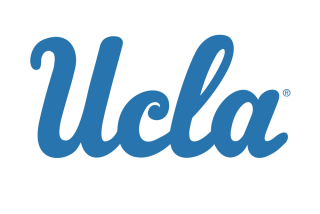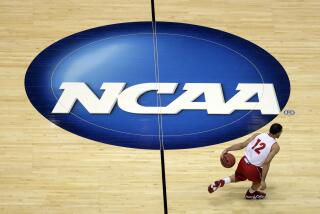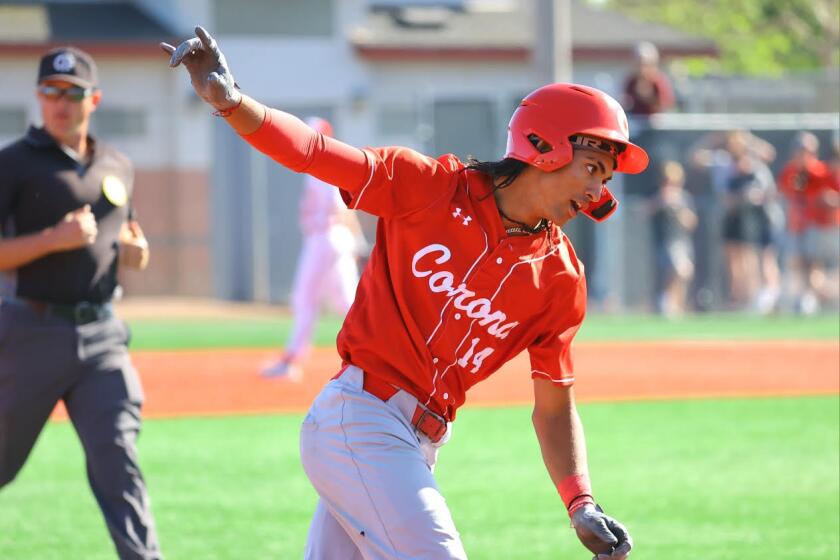NCAA: Nothing Changes : Basketball: The ruling allowing Nevada Las Vegas to defend its title should not be taken as a sign enforcement is weakening.
- Share via
The decision by the NCAA Committee on Infractions to modify its penalty against the University of Nevada Las Vegas basketball program and allow the Rebels to defend their NCAA title should not be taken as a sign that the committee will bend similarly in other cases, the committee’s chairman said Friday.
“We do not see this as precedent-setting,” said D. Alan Williams, a history professor at the University of Virginia. “This provides no precedent for any other series of (cases) that are before us and certainly not those that have arisen under the post-Sept. 1, 1985 rules (calling for tougher and more rigid penalty guidelines).”
The committee, which originally barred UNLV from postseason play in 1991 as a final penalty stemming from the 1977 case that caused Rebel Coach Jerry Tarkanian to take the NCAA to court, announced Thursday that it was offering UNLV a choice of two sanctions in lieu of forgoing the 1991 NCAA tournament.
UNLV President Robert Maxson chose a penalty that will keep the Rebels off live television and out of postseason play during the 1991-92 season.
The committee’s ruling set off alarms on other campuses where the enforcement arm of the NCAA has been felt.
“I sure wish they’d given us a multiple-choice penalty,” said Kansas basketball Coach Roy Williams, whose 1989 team could not defend the NCAA title because of sanctions stemming from Larry Brown’s time as coach.
Oregon State basketball Coach Jim Anderson said he would like the NCAA to consider rescinding the penalty it levied against his program in 1984. Oregon State was placed on one year’s probation and forced to return $342,634 it earned from the 1982 NCAA tournament for rules violations that included players selling complimentary season tickets or trading them for merchandise during the 1981-82 season.
“Maybe now a lot of schools should go back and ask for the same courtesy extended to Vegas,” Anderson said.
Infractions committee chairman Williams declined comment on most aspects of the UNLV case, saying the committee’s eight-page report released Thursday sufficiently portrays his views. But he made it plain that the ruling is not an indication that the five-member committee is willing to reconsider penalties in other cases.
At the heart of the UNLV matter, Williams said, was the fact the committee was ruling on an order issued 13 years ago for UNLV to suspend Tarkanian or “show cause” why additional penalties should not be assessed against the school.
“This is under 1977 procedures and circumstances,” he said. “Under the post-1985 rules, the association can take action against the coach. He has to sign that into his contract.”
Williams said, a “show cause” order leaves ground for give-and-take between a school and the committee. A standard institutional penalty, such as the postseason ban levied against Kansas in 1988, does not, he said.
And complicating the situation with UNLV, he said, is the District Court injunction in Las Vegas that prohibits the school from taking action against Tarkanian.
“A ‘show cause’ penalty is directed at the institution to say, ‘Show cause why additional penalties shouldn’t be enacted unless you take action against Coach A, Player B or Booster/Alumnus C,’ ” Williams said, explaining that the NCAA could not penalize the school unless the school penalizes the individual in such cases.
“Kansas says, ‘Gee, why couldn’t we have done this?’ Well, they couldn’t because it wasn’t a matter of showing cause why an additional penalty shouldn’t have been imposed upon Kansas if they didn’t take action against Coach Brown. It was a matter of (the committee saying), ‘You did this. You’re a repeat violator. That’s your problem.’ ”
When UNLV offered four alternative penalties that would allow the Rebels to defend their title--two involving Tarkanian, two involving the program as a whole--at a second meeting in October, the committee combined the UNLV proposals to form the two alternatives presented Thursday.
The report noted that had UNLV presented its four proposals at the June meeting, the committee probably would have ruled similarly to what it did Thursday.
But the report also indirectly acknowledged the possibility of court action by Tarkanian or UNLV players in the event that the original penalty remained in place, stating that the committee proposed alternative penalties because it felt it was time for the “lengthy dispute” between Tarkanian and the NCAA to end.
More to Read
Go beyond the scoreboard
Get the latest on L.A.'s teams in the daily Sports Report newsletter.
You may occasionally receive promotional content from the Los Angeles Times.










